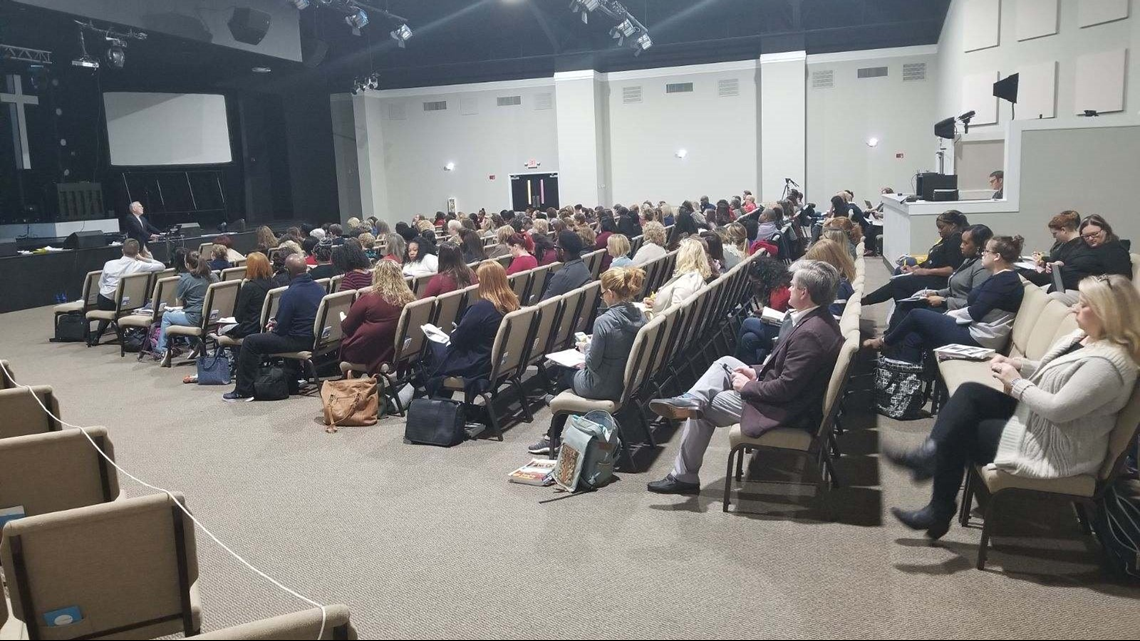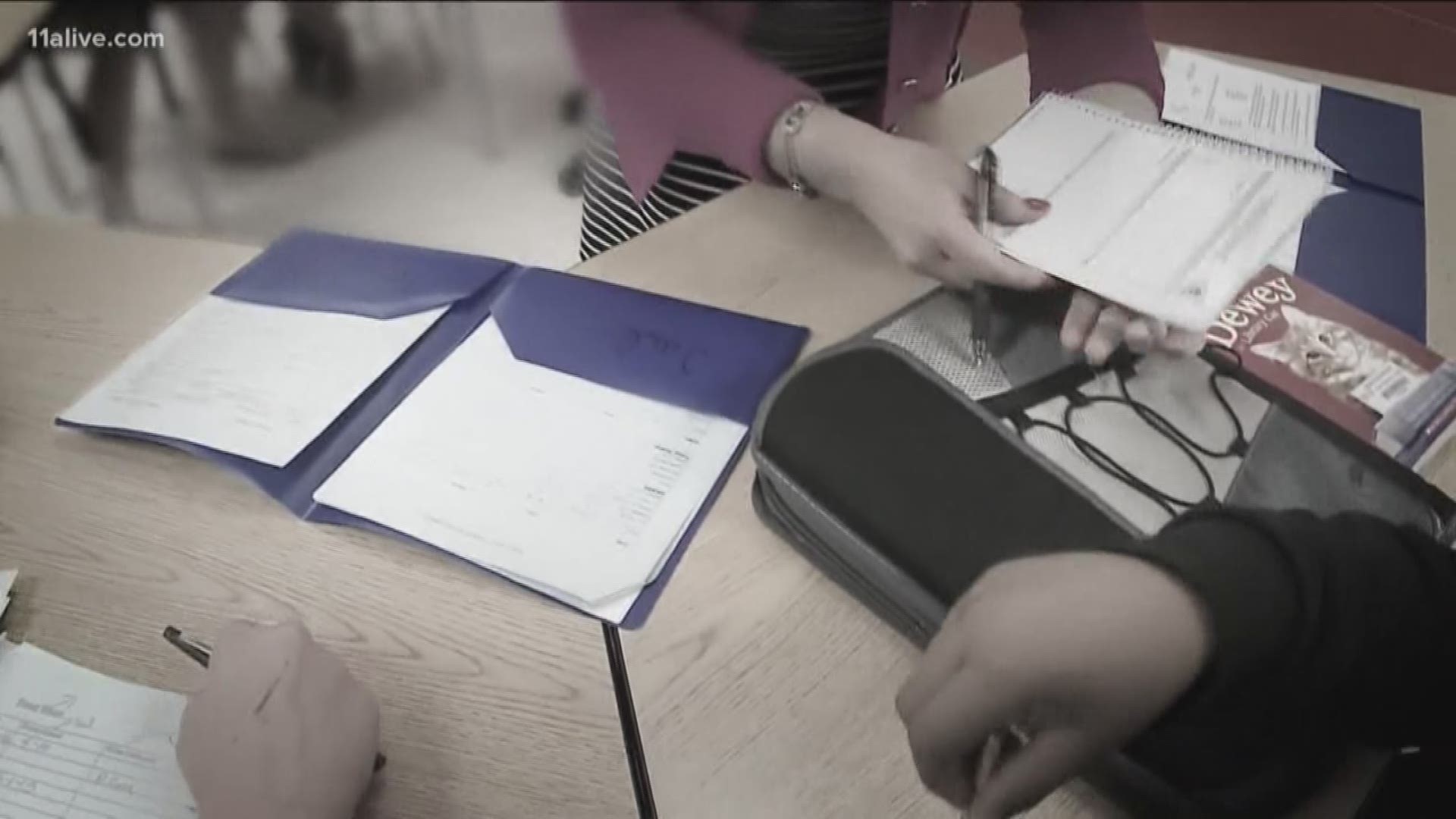Taylor Brown shares many of the same passions most teenage girls do around her age. The 16-year-old high school sophomore loves gymnastics, music and even podcasts.
“I love murder mystery podcasts,” said Taylor. “I listen to [it] and then pause it to try to figure it out myself before it gets to the end.”
In the classroom, though, she struggles to grasp material as quickly as her peers.
“It takes a lot more time to get things done,” said her mother, Shevon.
A few years ago, doctors diagnosed her daughter with attention deficit disorder and anxiety.


Taylor said the slightest distraction in class can impact her ability to concentrate.
“I get frustrated with myself because I’m trying to tell myself over and over again to just zone it out and get back to doing my work,” said Taylor.
Ms. Brown said her daughter's teachers are supposed to follow Taylor’s IEP – or individualized education plan – during classroom instruction.
According to the legally-binding agreement, Taylor needs more attention and time during class assignments. She attends Mundy’s Mill High School in Clayton County.
“But, it’s still not being done and I can say that because she’s still failing,” said Brown. “Somebody should be working with her. Somebody should be providing those accommodations to her during those 50 minutes of that one class period, but day-in and day-out, it’s 50's, 40's, 30's. So, it’s a constant battle with the school.”
According to records obtained from the Georgia Department of Education (GDOE), 38 percent of Mundy’s Mill High’s special education courses last year were taught by teachers without specialized training.
“It’s hurting as a parent, knowing that my child is not receiving what I’ve been told - what we’ve been offered. And, it shows,” Shevon said.
The Clayton County School District did not directly respond to Brown’s concerns, but, in a prepared statement, said the district recognizes its shortage of special education teachers.
“Clayton County Public Schools has not been exempt from this phenomenon. Clayton County Public Schools works continuously to recruit and retain all highly qualified teachers in their field area. Unfortunately, the pipeline of future special education teachers is producing minimal highly qualified teachers who possess both special education certification and specialized content certification needed to be considered fully certified “in-field."
Please be advised that the report referenced in your media inquiry indicates that we do not have certified special education teachers in our building. We can confirm that Clayton County Public Schools currently has certified special education teachers employed within our school district. It should also be noted that some special education teachers may often provide support in other areas not specified on their certifications to help serve and support children. Without a copy of the exact report indicated we cannot confirm, according to your statement, that instructors are teaching out of their field," wrote a district spokesperson.
Federal law requires all children, regardless of their disabilities, to a free and appropriate public education. But, according to the state records, special needs students don’t have nearly enough specifically-trained teachers in Georgia to help.
A Reveal analysis of hundreds of schools across Georgia show the majority of special education courses are taught by underqualified teachers.
Find out how many underqualified teachers your school has, in our searchable database (story continues below database)
Some of metro Atlanta’s largest high schools have the highest percentages. At Shiloh High School in Gwinnett County, GDOE records show 79 percent of its special education courses were led by instructors teaching out of their field last year.
It’s one of 39 metro Atlanta high schools where more than 50 percent of special education courses were taught by underqualified teachers.
Special needs teachers often require the most specialized training. They teach students with a wide range of disabilities, from autism to dyslexia. Yet, state and federal education systems have lagged behind in hiring these teachers and the vulnerable populations in their classrooms.
The federal government didn’t even mandate education to students with disabilities until 1975. Until recently, Georgia didn’t require schools to test students for dyslexia.
The legislature passed a law earlier this year requiring it.
The new law came too little, too late for Jamie Fincher and her son Levi, a first grader at Kincaid Elementary in Cobb County.


Levi struggles with dyslexia.
When the six-year-old started the school year, Fincher said she learned his special education teacher didn’t have specialized training in dyslexia she thinks is needed to help her son.
"That tells me that what she’s doing, there’s probably some components that will be beneficial, but for these kids, it needs to be very systematic and very repetitive,” said Fincher.
According to records obtained from the GDOE, about a third (32%) of all special education courses taught at Kincaid Elementary last year were led by instructors, teaching out of their field.
“I really feel the teachers want to do what’s best, but they’re not equipped,” said Fincher.
The Cobb County School District disagrees with the numbers the state provided, calling the data “misleading.” A district spokesperson also explained that only one of the teachers at Kincaid teaches out of their field.
"Teaching special education is one of the most rewarding careers in education - it's also one of the most difficult. Every school in Cobb and in Georgia needs more highly qualified special education teachers than there are special education teachers looking for jobs," wrote a district spokesperson in an email.
Cindy Saxon is an associate superintendent at the GDOE. She said the state knows it has a shortage of certified special education teachers, a problem Georgia shares with the rest of the country.
“Teach special education is difficult. You’re constantly seeking and looking for strategies to help those students learn to take them where they are today and make them a little better tomorrow,” said Saxon.


To help certify more special education teachers, Saxon said the state couples future instructors with more experienced teachers for three years.
“We pair them with a master teacher or a buddy teacher to help provide additional support. Many districts across the state hold monthly or quarterly meetings with their induction-level teacher,” said Saxon.
There are federal programs which forgive student loans for teachers pursuing special education certification, but Georgia offers few incentives. The state provides financial assistance for teachers seeking math and science certification, but not special education.
Saxon said she supports any measure to get teachers more money but stopped short of saying the state should also fund special education certification assistance.
“I think that is a fiscal question for the legislature. So, I’m not going to speak to telling them what to do with their money,” said Saxon.
Stephen Owens isn’t surprised. He’s a senior education policy analyst with the Georgia Budget & Policy Institute.
“That’s always the population that’s going to be left out first. So, the fact that we don’t have a stipend for special education doesn’t strike me as odd at all,” said Owens.
Owens, a former GDOE research analyst, said special education teachers should be the state’s top priority.
“They’re working on self-sufficiency; they are working on self-esteem, and for that reason, this is a group of teachers that needs to be cared for the most and pay needs to be the first step on that,” said Owens.
Many parents become so frustrated trying to get their child help, they take districts to court or become experts in special educate law themselves.
This past February, 175 parents packed a church in Macon to hear experts speak at the Special Education Law and Advocacy Conference. The event focused on helping parents learn more about their rights and what schools are required to provide to their special education children.


“I knew we were on our own and it was time to bring this conference to Georgia when the Opportunity School District was voted down. I hope to make this an annual event with the ultimate goal of raising an army of attorney and non-attorney advocates to improve the quality of life for children inside Georgia’s school system,” said Kelly Neal, an attorney and volunteer advocate who helped organize the event.
Neal says parents from as far away as Oregon came to the seminar.
Fincher drove in from Cobb County to attend the conference. “Our school system is structured in a certain way to teach a certain type of learner in a certain way. Kids with learning challenges are capable of learning, but it just needs to be done in a different way,” said Fincher.
For those who don’t have the financial means to attend conferences or hire attorneys, Atlanta Legal Aid can help some parents. The organization represents low income families who are struggling to get resources to special needs children.
Kathleen Dumitrescu is staff attorney at Atlanta Legal Aid, who specializes in representing individuals with disabilities.
She says uninformed parents can be mislead by districts without knowing their rights. “When they get into the schools and people with advanced degrees tell them your kid is making bad choices, your kid is just doing the wrong thing, we are going to discipline them, it’s hard for them to fight back against that type of stuff,” explains Dumitrescu.
The Legal Aid attorney said she once represented a parent who lost her job because she had to stay home with her child after the school sent him home for behavioral problems. Oftentimes, when special needs students don’t have a teacher with specialized training, they grow frustrated and act out.
“So, everything in their life started falling apart when the school system failed to be able to provide the resources they needed to keep these kinds in school,” said Dumitrescu.
The Reveal is an investigative show exposing inequality, injustice, and ineptitude created by people in power throughout Georgia and across the country. It airs Sunday nights at 6 on 11Alive.

